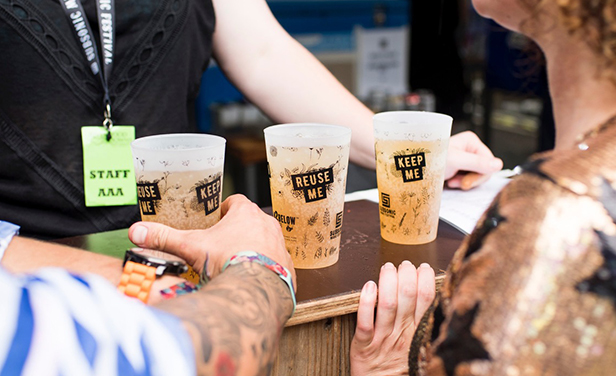5 Myths About Planning Sustainable Events

Sustainability and “green” practices are becoming standard for many corporations, driven by both a belief in corporate responsibility and by customer mindset. A recent Nielsen global online survey shows 81 percent of respondents feel strongly that companies should help improve the environment.
The initial worry that sustainable events would result in higher costs has subsided. In fact, it has been shown that environmentally-friendly events can actually cost less, as they require a more mindful approach to waste reduction. But there is still quite a bit of misperception related to what it takes to plan a successful sustainable event.
In this article, we cover five commonly-held beliefs and explain the reality behind them.
Food Donation is Illegal
Many planners, and even some venues, still believe that the donation of leftover food is illegal.
“If we can get one thing through everybody's mind (about minimizing food waste), it should be that it is not illegal to donate food when done properly,” says Jim Spellos, director of technology at food recovery organization, Rock and Wrap It Up.
The Bill Emerson Good Samaritan Food Donation Act was created to encourage the donation of food and grocery products to qualified nonprofit organizations and provides liability protection to food donors. Under this Act, as long as the donor has not acted with negligence or intentional misconduct, the company is not liable for damage incurred as the result of illness.
Spellos suggests starting conversations on food donation and sustainable planning during the RFP process. If your prospective venue is not able to meet your organization’s sustainability standards, it might be time to consider an alternative event location.

“Green” Equals Unattractive
Many planners (or their executive team) are concerned that sustainable events will look unattractive. They picture soggy cardboard signage and cheap-looking décor. Yet environmentally friendly production doesn’t have to mean ugly materials.
Event apps have supplanted or at least reduced printed materials across the industry. Digital signage and projection technology have dramatically cut back on the need for printed signage and banners. Recyclable carpet for concrete exhibit floors is now available through many show decorators. And all of these things can make your event look even more professional.
“Eco-friendly substrates such as honeycomb or cardboard — or even heavy-duty, high-quality paper — are not only recyclable, they lend your booth a sophisticated and updated look, impressing attendees,” says Jessica Glenn, sustainability manager for Freeman.
SWAG is Incompatible With Sustainability
Thinking green doesn’t mean that you can’t give your attendees gifts. Tchotchkes or swag (stuff we all get) are synonymous with events for many attendees — and many are disappointed if they don’t get any personal takeaways.
Think about things like food items from local vendors (which also helps support your local economy). Metal or recyclable water bottles paired with water stations in lieu of bottled water are an excellent idea, but unfortunately, have become so popular that they risk becoming a casualty — so many attendees have a whole collection at home.
A more novel gift idea is the metal straw set. As more and more hotels and convention centers abolish plastic straws, yet on-property coffee shops continue to serve iced beverages to people on the go, these reusable alternatives are a practical takeaway item for attendees.
For more tips on alternatives to swag, including charitable donations, check out this Meetings Imagined blog post.
It’s Impossible to Have a Truly Zero-waste Event
Not so, says sustainable events consultant Julia Spangler — although it does take a lot of planning, both in advance and during the event. It may also require a mind shift away from doing things in the same way you have always done them.
Spangler suggests identifying the most wasteful aspects of your event and focusing on those. At many events, she says, meals are often the biggest drivers of waste. If you’re serving on all disposable dishes and using plastic cups or handing out a lot of bottled beverages, switching them out for reusable items — and choosing suppliers who follow sustainability best practices — can go a long way towards waste reduction.
The Rockefeller Foundation offers a free toolkit for organizing food-waste free events that can be downloaded here.
Sustainability is a Standalone Effort
Corporations today have a number of different initiatives in place that overlap in some way. Sustainability, corporate social responsibility, governance, human rights, diversity and inclusion — they all intersect, says Gwen Migita, vice president of social impact and inclusion and chief sustainability officer for Caesars Entertainment.
“There’s more awareness of the big issues,” she says. “I’m seeing a blending of environmental social sustainability with a lot more interest around the governance of a company.”
Migita says that one of these areas of intersection is around food waste reduction and sustainability with food scarcity, adding that the focus for the events industry is shifting to an entire value chain around food scarcity — from buying, planting, manufacturing, transportation, preparation and all points in-between.
If everyone across the events industry pitched in to promote sustainability, we could do a world of good — and good for the world.
If you aren’t sure how to get started, take a look at the MeetGreen Green Event Checklist. The Events Industry Council Sustainability Initiative also offers resources, information and tools that can help corporate planners make sustainable choices and educate additional decision-makers within their organizations.
Want to learn more about planning sustainable events? Go here.
Don’t miss any event-related news: Sign up for our weekly e-newsletter HERE and engage with us on Twitter, Facebook, LinkedIn and Instagram!


Add new comment